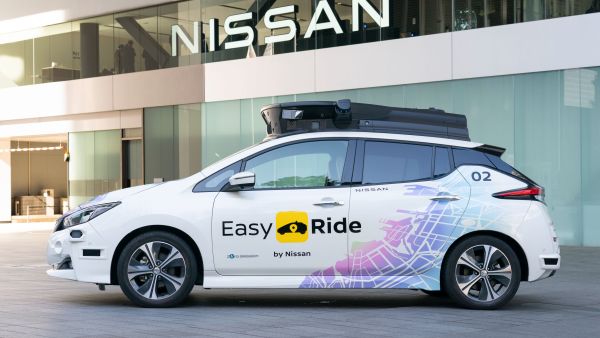Nissan demonstrates autonomous-drive mobility services progress on public roads

YOKOHAMA, Japan (04 June 2024) – Nissan has commenced demonstrations of a prototype vehicle equipped with its in-house-developed, autonomous drive technologies - showcasing progress in its goal towards rolling out autonomous mobility services within fiscal year 2027.
The Nissan LEAF prototype vehicle incorporates 14 cameras, 10 radars and 6 LIDAR sensors. It demonstrates Nissan’s progress in the field of autonomous driving, particularly within complex urban environments. Compared to earlier prototypes the company has demonstrated, the latest test vehicle features an array of roof- mounted sensors, significantly expanding the detection area and enabling more accurate detection of its surroundings.
As a result, recognition performance, behavioral prediction, and judgment functions, as well as control functions have been enhanced, delivering smooth operation in a variety of complex scenarios. Around the busy streets of Yokohama, close to Nissan’s global headquarters in Japan, the LEAF prototype is able to smoothly demonstrate its ability to predict the behavior of pedestrians, conduct lane changes when merging, and judge when to safely enter intersections.
Nissan has been studying business models for future mobility services since fiscal year 2017. While the current demonstration is being conducted at SAE Level 2 equivalent with a safety driver present, the company aims to continue to expand functionality and to begin offering autonomous-drive mobility services within Japan, starting in fiscal year 2027*, working with third parties such as local authorities and transport operators.
In the fourth quarter of this fiscal year, Nissan aims to begin trials in the Minato Mirai area, and plans to progress to service demonstration tests within fiscal year 2025. During the trials, the level of autonomous driving functionality will be
gradually increased while assessing customer acceptance, with the aim of providing driverless services.
This initiative is being conducted in close cooperation with the Japanese Ministry of Economy, Trade and Industry; Ministry of Land, Infrastructure, Transport and Tourism; and other central ministries. The ministries will also promote initiatives to realize new autonomous mobility services at the Level 4 Mobility Acceleration Committee that they organize.
Nissan’s long-term vision is to empower mobility by solving transportation service issues faced by local communities. Local communities, particularly within Japan have been facing several mobility challenges, such as driver shortages, which are a result of an ageing population. Supporting a resolution to this challenge, Nissan will provide a broad range of new services that enable free movement.
Background Information
Nissan Middle East
Nissan’s heritage in the Middle East goes way back to 1957, when the first Nissan vehicle was sold in Saudi Arabia. Since then the Nissan Legacy has taken deep roots in the hearts of the Middle East people by becoming an integral part of their lives.
Currently Nissan is one of the most popular and successful automobile brands in the Middle East boasting of a strong line-up ranging from popular passenger cars to powerful 4x4 series and commercial vehicles.
In its quest to closely understand the local needs of its customers, Nissan Motor Co. Ltd. in June, 1994 set up a regional Middle East head quarters in Dubai, thus becoming the first Japanese car manufacturer to accomplish this feat. The Nissan Middle East FZE office houses a highly sophisticated training center which serves as an excellent training ground for undertaking Nissan customer care and service activities.






